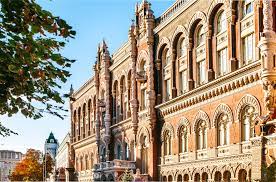
Net sale of dollars by the National Bank of Ukraine (NBU) rose from $133.7m, the lowest value in the last 11 months, to $262.6m this week, the regulator’s data show.
According to them, the sale of currency increased from $156.8 million to $263.0 million, while the purchase fell back to almost zero, although the National Bank managed to buy more than $50 million on the market in the previous two weeks after a long break.
The official hryvnia exchange rate weakened by almost 66 kop. – From 38.1410 UAH/$1 to $38.7998 UAH/$1 – the lowest level in the history of the national currency. At the same time, market participants note that the decline occurred with a relatively small volume of trading.
On the cash market, the hryvnia exchange rate followed the interbank rate, but with a smaller amplitude: a strong weakening in the first three days and relative stabilization at the end of the week. As a result, during the week it decreased by about 33 kop. – from UAH 38.53/$1 to UAH 38.86/$1. At the same time, according to the NBU, despite the weakening of the exchange rate in the first half of the week, the negative balance between the volume of foreign currency purchases and sales by the population decreased during these days: from $28.6 mln on Monday to $10.3 mln on Wednesday
At a press conference on March 14, representatives of the National Bank said that by the end of April they expect external financing in the amount of $10bn or more, which will allow to restore reserves, while before that Ukraine had received only $1.2bn since the beginning of the year.
At the same time, the NBU noted that such non-rhythmic external financing will not lead to any shocks on the currency market.
As reported, at the end of February, the NBU’s net sales fell to $1.50 billion from $2.53 billion in January, $3.55 billion in December and $2.45 billion in November.
However, in February, external support amounted to only about $0.8bn, so international reserves fell by 3.8% or $1.47bn to $37.05bn after falling by 4.9% or UAH $1.98bn in January.
The National Bank in January lowered its forecast for Ukraine’s international reserves at the end of 2024 to $40.4 billion from $44.7 billion.
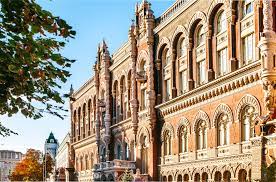
The National Bank of Ukraine has approved the head of the board of the nationalized Sense Bank (Kiev), Oleksiy Stupak, selected earlier by the supervisory board of the financial institution for this position following a competition, the bank’s press service said on Monday.
“On February 15, 2024, the National Bank of Ukraine has agreed Oleksiy Stupak as chairman of the board of Sense Bank,” the release said.
As reported, Stupak started his career in 2002 in Pravex Bank, where he was responsible for working with corporate and VIP clients. He then held senior positions at Credit Agricole Bank from 2008.
In June 2019, he joined the Sence Bank team, assuming the position of Corporate Business Director, after which he became the supervisor of Corporate and Investment, SME, which he has been doing until now.
Former Sense Bank CEO Dmitry Kuzmin, who was appointed to this position during the bank’s nationalization at the end of July 2023, resigned by mutual agreement for personal reasons a few weeks after his appointment. Kuzmin’s deputy Yelena Zubchenko, who worked in the Ministry of Finance before the bank’s nationalization, was appointed acting head of the board.
According to the NBU, as of January 1, 2024, Sense Bank ranked 8th among 63 operating banks in Ukraine in terms of assets (UAH 131.2 billion). It was nationalized at the end of July 2023 under a specially adopted law as a systemically important bank with majority shareholders from Russia’s Alfa Group caught up in sanctions. At the same time, the state appointed an entirely new management board and supervisory board.
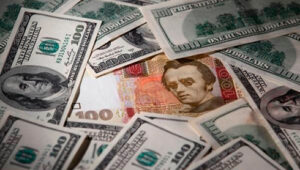
Net sales of dollars by the National Bank of Ukraine (NBU) this week dropped to $530.9 million from $673.3 million a week earlier, according to data on the regulator’s website on Friday.
According to the data, in the first half of this week, for which the central bank has already published data, purchases of foreign currency by bank clients increased from $205.3 million on Monday to $239.6 million on Wednesday.
The official hryvnia exchange rate weakened by only 9 kopecks over the first two days to 37.9247 UAH/$1 on Tuesday, after which it began to strengthen: by 3 kopecks on Wednesday, and then by 19 kopecks and 18 kopecks on Thursday and Friday, respectively. As a result, the official hryvnia exchange rate at the end of the week amounted to 37.5268 UAH/$1.
According to Raiffeisen Bank’s chief dealer Serhiy Zarytsky, the maximum hryvnia appreciation recorded on Friday on the interbank market was 37.5050 UAH/$1, while the dollar peaked at 37.68 UAH/$1.
The banker noted that the trading volume on Bloomberg on Friday increased slightly compared to Thursday: $159 million versus $130 million.
“The NBU, as always, controls the situation and continues to meet the needs of buyers. At present, the NBU’s interventions do not exceed the established volumes of structural demand,” Zarytsky emphasized.
According to his personal estimates, the regulator sold an amount ranging from $120 million to $150 million at the auction.
On Friday, the reference value of the exchange rate set by the National Bank at 12:00 increased by 23 kopecks to 37.5399 UAH/$1.
Since Monday, the hryvnia has strengthened by 0.8%, or 31 kopecks, and by 1.3%, or about 48 kopecks, compared to the exchange rate at the beginning of this year. Its weakening since the National Bank switched to managed flexibility on October 3, 2023, has decreased to 2.6%, or 92 kopecks.
On the cash market on Friday, the hryvnia strengthened by 0.4% to 38.25 UAH/$1, and by 1.6% or 61 kopecks since Monday.
According to the NBU’s monthly surveys, exchange rate expectations for the next year have deteriorated slightly. In particular, in October 2023, banks expected the exchange rate to be 41.16 UAH/$1 in the next 12 months, while the updated January forecast indicates that the hryvnia is expected to devalue by 0.4% to 41.31 UAH/$1. For their part, financial analysts have revised their forecast a little more significantly: they expect the hryvnia to depreciate by 0.5% to 40.29 UAH/$1 in December 2023, compared to their previous forecast.
As reported, in December, the NBU’s net sales increased to about $3.57 billion from $2.46 billion in November, $3.34 billion in October, and $2.69 billion in September. Last month, the Ministry of Finance attracted $5 billion in external financing, which increased international reserves by 4.4% in December to $40 billion 507.9 million, the second highest level in history after July 2023.
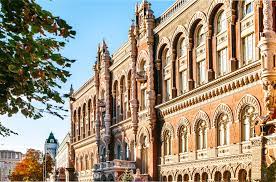
The National Bank of Ukraine (NBU) on Thursday, the penultimate day of trading, weakened the official hryvnia exchange rate by 0.96%, or 36 kopecks, to a new low of 37.98 UAH/$1. According to the NBU rules, this rate will be valid for the remaining days of the year – December 29-31.
The reference value of the hryvnia exchange rate set by the National Bank at 12:00 p.m. on Thursday also decreased by 1%, or 39 kopecks, to 37.9404 UAH/$1.
According to market participants, trading on Thursday was active from the very morning: in the first hour and a half their volume amounted to about $150 million, and transactions even before noon were concluded at the rate of 37.97-37.99 UAH/$1, with offers at the rate of 38.03 UAH/$1.
According to the calculations of the ex-head of the analytical department of Sense Bank Alexey Blinov, the average official rate at the end of 2023 was 36.57 UAH/$1, which is almost identical to the fixed rate, which was in effect for 14 months until October 3 of this year.
The expert specified that the official year-end closing rate for the euro is 42.21 UAH/EUR1.
On the cash market on Thursday, the dollar exchange rate rose even more – by about 45 kopecks, to 38.72 UAH/$1.
The weakening of the hryvnia in recent weeks, the National Bank attributes to the seasonal increase in demand for foreign currency.
As reported, the National Bank’s net sales in November fell to $2.46 bln from $3.34 bln in October and $2.69 bln in September. However, the reduction of external financing to $2.04 billion led to a decrease in international reserves for the fourth consecutive month – by 0.5%, or $187.8 million – to $38 billion 785.2 million.

The National Bank of Ukraine (NBU) together with international partners, in particular the World Bank and the European Bank for Reconstruction and Development (EBRD), are preparing a new mechanism for settling military risks, which they plan to present no later than the first quarter of 2024.
As noted on the NBU Facebook page, during the meeting of the regulator’s management with participants of the insurance market, the head of the National Bank Andriy Pyshnyy emphasized the importance of the introduction of insurance of political-military risks, which should be fully operational next year.
It was also noted that one of the priorities of the National Bank in 2024 is the development of a competitive, adaptive and cost-effective insurance market.
“New requirements for insurance companies bring us closer to European standards of regulation and supervision. Therefore, the implementation of new norms is a priority, and integration into the European community is task No. 1. We will have to move as fast as possible, but you can count on comprehensive support and mature constructive dialog,” Pyshny said, speaking about the importance of such changes for domestic insurance.
It was noted that in 2024, in particular, will begin the application of risk-oriented prudential supervision and improvement of requirements for the solvency of insurers, as well as a new type of supervision of market behavior of insurers to control compliance with the rules and standards of financial services.
“The National Bank is strengthening its staff with specialists who will evaluate insurers’ business models using a risk-based approach. Special attention will be paid to the assessment of insurers’ assets – property and securities, the value of which should be market-based,” Deputy Head of the NBU Dmytro Oleinik said during the meeting.
Separately, emphasis was placed on the importance of the work of financial monitoring units of insurers as a safeguard to attract companies to money laundering schemes, in particular for the purpose of tax evasion, and to limit ties with Russia.
At the same time, it was noted that the work continues in the Parliament to finalize the text of the new law “On compulsory insurance of civil liability of owners of land vehicles,” which should be adopted under the IMF program by the end of May next year.
Now insurance companies will have to prepare for the renewed field inspections by the National Bank in order to eliminate possible violations of the law in advance, emphasized representatives of the regulator.
Andriy Pyshnyy, EBRD, European Bank for Reconstruction and Development, NATIONAL BANK OF UKRAINE, NBU, WORLD BANK
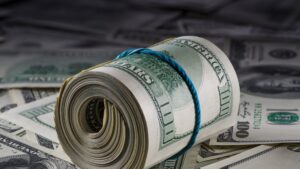
Net sales of dollars by the National Bank of Ukraine (NBU) increased to $977.3 million last week from $862.5 million a week earlier, the last time the NBU sold more in the first week of the transition to managed exchange rate flexibility in early October.
In the first half of the week, according to the central bank, purchases of foreign currency by bank clients grew, reaching $475 million on Wednesday and exceeding sales by $260 million.
As a result, the NBU on Wednesday weakened the hryvnia by 0.6%, or 23 kopecks, and in total for the first three days of the week – by 1.4%, or 53 kopecks.
On Thursday, however, the depreciation was very slight, and on Friday the NBU even strengthened the exchange rate by 4 kopecks to 37.5525 UAH/$1.
Overall, since November 26, when the national currency began to weaken, the dollar has risen by 4.3%, or UAH 1.54. At the same time, due to the strengthening of the hryvnia in the first time after the National Bank switched to a managed flexibility regime on October 3, the dollar rose by 2.7%, or 98 kopecks, against the fixed exchange rate that had been in effect for more than 14 months.
On Friday, the dollar also fell slightly on the cash market – by 11 kopecks, to about 38.10 UAH/$1.
As reported, the National Bank’s net sales in November fell to $2.46 billion from $3.34 billion in October and $2.69 billion in September. However, the reduction in external financing to $2.04 billion led to a decrease in international reserves for the fourth consecutive month – by 0.5%, or $187.8 million, to $38 billion 785.2 million.